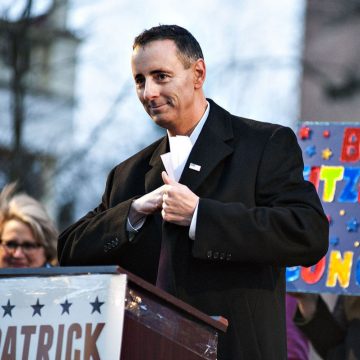
U.S. Rep. Brian Fitzpatrick of Pennsylvania wants an online gambling ban, much like his predecessor in the 8th congressional district, Michael Fitzpatrick, once did. The continuity is no coincidence, because the two men are brothers.
Michael Fitzpatrick, the retired Pennsylvania legislator, once led a multi-year task force to determine whether online gambling funded terrorism. Despite getting local publicity for the probe, the former Rep. Fitzpatrick never found links between iGaming and ISIS.
In 2016, Brian Fitzpatrick ran to replace his brother, who had served for the 8th congressional district the previous four terms. Michael Fitzpatrick left, because of a term limit promise he made.
Fitzpatricks’ Opposition to Online Gambling
Before he left office, Michael Fitzpatrick introduced a comprehensive ban on online gambling in the State of Pennsyvlania. The language of his bill criticized the 2011 opinion by the U.S. Department of Justice, which allowed states to legalize online poker and online casinos.
Fitzpatrick’s bill stated, “This bill declares that the Memorandum Opinion for the Assistant Attorney General for the Criminal Division of the Department of Justice (dated September 20, 2011) shall have no force or effect for purposes of interpreting the definition of ‘unlawful Internet gambling’ under current federal law.”
Less is known about Rep. Brian Fitzpatrick‘s stances on the issues, but he ran as an opponent of online gambling. Reason.com reported that Brian Fitzpatrick is framing a letter to US Justice Department, asking the nation’s leading law enforcement division to “unilaterally declare state [online gaming] efforts illegal”.
Jeff Sessions: IGaming Ban?
Attorney General Jeff Sessions has the authority to take a unilateral action, though it is unknown if Sessions has the political will to do so. The decision hinges on the Justice Department’s interpretation of the 1961 Wire Act — whether sports betting alone or all forms of gambling were banned under the wire act. The UIGEA states it bans any form of online gambling which was banned under the Wire Act (for telephone lines).
Reason noted that having Jeff Sessions redefine the UIGEA to ban online casinos and poker sites would “allow Adelson’s army to sidestep the pesky legislative process altogether and unilaterally declare state efforts illegal.”
Sheldon Adelson’s Anti-Gambling Crusade
Banning online gambling is a pet project of Sheldon Adelson, who as founder and CEO of Las Vegas Sands Corp is the wealthiest gambling executive in the world. At Adelson’s urging, national politicians like Sen. Lindsey Graham, Sen. Marco Rubio, Sen. Mark Warner, Rep. Jason Chaffetz, and Rep. Charlie Dent have supported a federal ban on online gambling, Restore America’s Wire Act.
The Reason article notes, “The issue is a fixation of GOP megadonor Sheldon Adelson, whose bricks-and-mortar Las Vegas casinos are threatened by competition from online gambling.”
Brian Fitzpatrick Doing LVS’s Bidding?
Brian Fitzpatrick’s district is adjacent to Northhampton County, where the Bethlehem Sands Resort and Casino is located. Bethlehem Sands is not only the Pennsylvania brick-and-mortar casino with the highest revenues in the state, but it is also Sheldon Adelson’s most lucrative American casino east of Las Vegas. Reason speculates that Brian Fitzpatrick is doing the bidding of Las Vegas Sands, just as Michael Fitzpatrick supposedly did the same.
The Fitzpatrick Brothers are swimming against the stream in Pennsylvania. As they lobby for a total ban on online gambling in the United States, their fellow Pennsylvania lawmakers continue to seek expanded online gambling in the state. With a budget shortfall, legislators want to extract between $200 million and $400 million out of a gambling expansion — with a lot of that money coming out of the online gaming sector.
Arguments against a Online Gambling Ban
Steve Ruddock of Online Poker Report noted that banning online casinos and poker sites does not end online gambling. It sends the hobby underground, where dedicated gamblers have few consumer protections, no responsible gaming resources, and no recourse if they are cheated by the operators.
Though Michael Fitzpatrick made a show of linking online gambling to terrorism, the laws he pushed for would create the kind of underground economy that would allow organized crime and other illegal international criminals to operate. Regulated online card rooms do not contribute to terrorist networks, though unregulated gaming sites might.















